Diversity

Responding to attacks on Muslims, Sojourners has been placing ads around the country with a simple reminder of Jesus' command regarding how we treat others. The billboards and subway ads read: “Love Your Muslim Neighbors.”
Now, the attacks have reached our nation’s capital. Pamela Geller and the American Freedom Defense Initiative’s hateful ads that refer to Muslims as “savages” were placed in Washington, D.C., Metro stations this week following a lengthy court battle. Sojourners was ready for this development and has purchased “Love Your Muslim Neighbors” messages that will be going up in the some of the same Metro stations targeted by the American Freedom Defense Initiative and should appear by the 15th of October.
The ongoing attacks against religious minorities both in the United States and around the globe are saddening and disturbing. You can help respond to the latest developments in DC by clicking here.
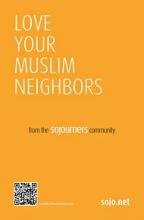
The racist, anti-Muslim ad in the New York Subway that used the language of civilized and savages has more than met its match.
A large group of Jews and Christians have countered that hateful message by tapping into the rich mines of neighborly love that are at the heart of Jewish, Christian, and Islamic traditions.
New ads by Rabbis for Human Rights , United Methodist Women, and Sojourners have tapped into the rich religious commandment to “love thy neighbor” to remind all of us to love our neighbors.

A house of worship in Ohio was hit by an arsonist this weekend, causing an estimated million dollars in damage. Services were rescheduled, members toured the building to see the destruction, and statements were made. The religious community felt targeted and was afraid of future attacks.
The fact that the space in question was the Islamic Center of Greater Toledo should not change our outrage. As Christians, we need to stand for religious liberty for people of all faiths. We need to love our neighbors and speak out against hate.
Soon after this weekend’s attack was made public, we put a plan into action to demonstrate our solidarity. As we have done in Missouri, Tennessee, and New York, we will be offering a simple, biblical message: “Love your Muslim neighbors.”
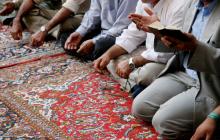
The variation in the proper way to pray is one among several differences that exist between Shiites, who make up about 15 percent of Muslims globally and in America, and the majority of Sunnis. Until recently, those differences mattered little in the United States, where the two groups bonded as Muslim minorities and prayed in the same mosques.
"There weren't enough of either to justify the cost of building sectarian mosques, and because in general, early generation immigrants were less focused on establishing formal houses of worship," said Andrea Stanton, a religious studies professor at the University of Denver.
That is changing, however, as American Shiites are increasingly establishing their own mosques. According to "The American Mosque 2011," a survey sponsored by several Muslim American organizations, 7 percent of roughly 2,100 mosques in America are Shiite, and most have been built in the last 20 years.
One reason: Shiites have become numerous and financially strong enough to manage the expensive process of buying or building their own mosques. Another factor: the growth in Shiite populations as immigrants flee persecution in Iraq, Bahrain, Saudi Arabia, Afghanistan, and Pakistan, where Taliban gunmen recently executed at least 22 Shiite bus passengers.
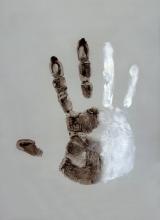
RACE WAS THE issue that changed the direction of my life. Growing up in Detroit in the early 1960s, the realities of white racism upended the world and church that I lived in.
What I saw and heard as a teenager painfully showed me that something was terribly wrong with my country and my religion. Trying to confront it got me virtually kicked out of my childhood church, led me into the civil rights and student movements, introduced me to the black churches, and set me on a path that would eventually bring me back to the good news of the gospel of Jesus Christ—which calls for social, racial, and economic justice. The historical tragedy, the “original sin,” of white racism in the United States is still a fundamental starting point to how I see the world.
So when I look at this election involving the first African-American president in U.S. history, I can’t help but go back to the critical questions of race. Let me be clear: To disagree with policies of President Obama and his administration is not racist. Agreements and disagreements are just that, and should not be correlated to race. And regardless of how we vote, we should all appreciate the fact that the role model of the Obama family living in the White House has convinced millions of young black men and women, and youth of all races—many for the first time—that they are really a part of this country and that they too could someday be president of the United States.
But I am concerned about how race has again distorted our politics. I want to speak directly to what those racial politics are and how people of faith should call them out and oppose them, no matter how we vote or what we think of the policies of the president.

WASHINGTON — Most Americans do not believe Scientology is a real religion, according to a recent poll by 60 Minutes and Vanity Fair.
The survey, conducted by CBS News, found that 70 percent of Americans say that Scientology is not a true religion; 13 percent believe it is; and 18 percent either don’t know or don’t care.
Out of the more than 1,000 people polled, Christian Americans were even more likely to question Scientology’s status as a religion — 79 percent of evangelicals, 74 percent of Protestants and 72 percent of Catholics surveyed responded that they did not think Scientology is a religion.
L. Ron Hubbard, a science fiction author, established Scientology in 1952, and the Church of Scientology has been acknowledged as a religion in the United States since 1993. Scientology is known for its celebrity followers, such as actors Tom Cruise and John Travolta.
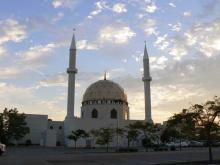
TOLEDO, Ohio — Muslim worshippers are reeling from an arson fire at the Islamic Center of Greater Toledo, but are grateful for an outpouring of support from the local interfaith community.
“All the support we get is very welcome because if you are going through a tragedy and you have a friend who is holding your hand it means a lot,” said S. Zaheer Hasan, a spokesman for theUnited Muslim Association of Toledo.
Perrysburg Township police ruled that the Sept. 30 fire was arson. Surveillance footage from the mosque shows a “person of interest” — a white middle-aged male wearing a camouflage sweatshirt and hat — at the mosque’s entrance shortly before the fire, which was reported about 5 p.m.
Mahjabeen Islam, president of the Islamic Center, said the suspect poured gasoline in the center of the main floor where men worship at the mosque. Women pray on the same main floor, but in an area separated by a low divider.
“It was set in the men’s prayer area and the sprinklers turned out the fire. There is a lot of water damage from the sprinklers,” Islam said. “The Islamic Center is uninhabitable for easily three months.”
New Jersey lawyer Abed Awad has been involved with more than 100 cases that involved some component of Shariah, or Islamic law, and knows firsthand how complicated things can get.
In one of those cases, a woman claimed she was married to a man according to Islamic law in her native west Africa. The man asserted there was no valid marriage, leaving a judge to decide whether the two were ever legally married in the first place.
If the judge rules they were married, there will be a divorce, and she will receive alimony and a share of marital assets. If the judge rules that there is no marriage, then the woman will be left with nothing from her relationship.
To make a ruling, the judge will need to consider what Shariah, as understood in one corner of western Africa, says about what constitutes a legal marriage. He will likely have to consult Islamic law experts and apply what he learns to his decision.
But what if American judges were prohibited from considering Shariah and other foreign laws, as many state and national politicians want to see happen?
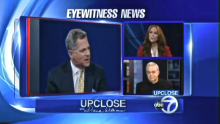
Maybe you've heard the buzz...
On Sunday, Sojourners' CEO Jim Wallis appeared on WABC-TV's Up Close news program in New York City to debate Pamela Geller of the Freedom Defense Initiative and Stop Islamization of America, who put up ads in NYC subway stations that read, "In any war between the civilized man and the savage, support the civilized man. Support Israel. Defeat Jihad."
Like many other folks of good faith, we at Sojourners were horrified by the blatantly hate-filled ads. We decided to do something to counter hate and fear with love and affirmation for our Muslim brothers and sisters. Last week, we began raising funds to purchase our own ad campaign in NYC subways with a simple message: "Love your Muslim neighbors."
Their debate got lively.
See for yourself inside the blog ...

Dear God,
As my son Zeke says in his daily prayers, so I say in our prayer this morning, "Thank you for all of the good things in the world."
One of those good things happened to me when I stopped by the water company to pay my bill. I walked into the building and stopped at the receptionist's desk to borrow a pen to write the check. I heard a family behind me and turned a saw a small child leading her mother by the hand, a mother carrying a baby in the cradle of her arm. The child listened to her Mother speak to her in Spanish, then looked at the receptionist and asked in English, "Can you show us where to pay our bill."
Suddenly and surprisingly the child looked up at me and threw her arms around me in a happy hug. "Mr. Barton!" she said. "I'm glad to see you, Mr. Barton!"

LOS ANGELES —The Egyptian-American man reportedly behind the anti-Islamic video that sparked weeks of Muslim protests worldwide was arrested and detained here Thursday (Sept. 27) over a federal probation violation.
Nakoula Basseley Nakoula, a 55-year-old Coptic Christian and onetime gas station owner, was placed in federal custody by U.S. Central District Chief Magistrate Judge Suzanne Segal over eight alleged probation violations stemming from his 2010 check fraud conviction.
Nakoula's probation violations include use of aliases and lying to probation officers; with new charges, he may serve another two years on top of the 21 months he served after the 2010 fraud conviction. Nakoula also had been barred in that case from going online or using computers for five years without probation officer approval.
Nakoula has said that he was the producer of the film, “Innocence of Muslims,” which depicts Islam's Prophet Muhammad as a child-molesting, adulterous fraud. Muslims worldwide have protested the film since a trailer posted on YouTube was broadcast in Egypt.

It takes a lot for me to get excited.
Maybe I'm cautious, or maybe I'm just a tough sell, but it takes a big something to get me on board.
Today was that big something.
Last week, Pamela Geller of the Freedom Defense Initiative and Stop Islamization of America, put up ads in New York City subway stations that read, "In any war between the civilized man and the savage, support the civilized man. Support Israel. Defeat Jihad."
Well, I think that's a problem. And Sojourners thinks that's a problem.
Our world is a powder keg, and Geller flagrantly lit a blowtorch with these ads, which, in case you were wondering, are protected fully under the Constitution.
They may be legal, but they're not moral.

Last spring, I heard a terrific talk from Shane Claiborne at the Festival of Faith & Writing. Claiborne, a prominent voice in progressive Christian circles, lives in Philadelphia’s inner city, where he and the other inhabitants of the Simple Way community practice a “new monasticism.”
They value hospitality and communal living, seek to build relationships with those living in their neighborhood, and are concerned with issues around poverty and wealth, power and violence. From the descriptions I’ve read, the Simple Way practices similar values to the Church of the Saviour in Washington, D.C., where I worshiped for most of my 20s. The Church of the Saviour had the unusual distinction of taking both Jesus and social justice seriously. It was a community in which I was comfortable speaking like an evangelical, while voting and approaching social issues like an Episcopalian.
Listening to Claiborne speak back in April about justice and love and how our stories illuminate God’s kingdom, I felt at home. Here was the kind of guy I used to worship with in my earnest urban-dwelling days. His message, his words, and his stories felt intimate, familiar, and inspiring.
That is, except for this one story...
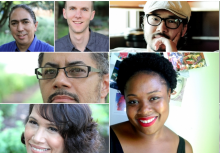
Today, Sojourners is launching a new project called Emerging Voices, and it’s one of the most exciting things I have been involved with for a long time. It aims to mentor, develop, and promote the most dynamic up-and-coming communicators — speakers, preachers, and teachers — who so clearly are called to lead and publicly articulate the biblical call to social justice.
The vision for this project is exciting and something to be celebrated. It also calls to mind a critical observation: Our world often wants saviors, not prophets; new messiahs, not leaders.
We want heroes with superhuman strength who save the day, not mere mortals who speak the truths we typically don’t want to hear. Even the modern day giants of social justice — Dr. Martin Luther King Jr., Dorothy Day, and Mahatma Gandhi, for example —were at best prophets, but never saviors.
It’s easy to slip into the mentality that one person, one voice will rise up in a generation, and that he or she will change the world as we know it. Perhaps we even think, “Maybe I will change the world.”
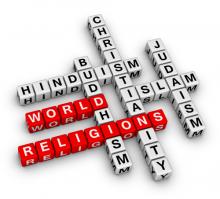
The typical American underestimates how many Protestants there are in the U.S., and vastly overestimates the number of religious minorities such as Mormons, Muslims, and atheist/agnostics, according to a new study.
Grey Matter Research and Consulting asked 747 U.S. adults to guess what proportion of the American population belongs to each of eight major religious groups: Protestant, Catholic, Jewish, Mormon, Muslim, atheist/agnostic, believe in God or a higher power but have no particular religious preference, and any other religious group.
The average response was that 24 percent of Americans are Catholic, 20 percent are Protestant, 19 percent are unaffiliated, 8 percent are Jewish, 9 percent are atheist or agnostic, 7 percent are Muslim, 7 percent are Mormon and 5 percent identify with all other religious groups.
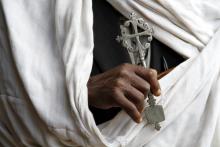
Coptic Christian leaders in the United States distanced themselves from an anti-Muslim film that has sparked protests in more than 24 countries, and denounced the Copts who reportedly produced and promoted the film.
"We reject any allegation that the Coptic Orthodox community has contributed to the production of this film," the Coptic Orthodox Archdiocese of America said in statement on Friday.
"Indeed, the producers of this film have taken these unwise and offensive actions independently and should be held responsible for their own actions."
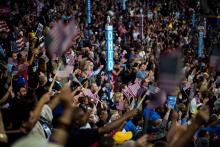
The number of Muslim delegates attending the Democratic National Convention has quadrupled since 2004, according to a Muslim advocacy group.
The Washington-based Council on American-Islamic Relations counts more than 100 Muslim delegates representing some 20 states at the Democratic convention in Charlotte, N.C., this week. That's up from 25 delegates in 2004, according to CAIR.
CAIR government affairs coordinator Robert McCaw said the numbers were ”a sign of the American Muslim community’s growing civic engagement and acceptance in the Democratic Party.” He also said that Democrats had targeted outreach to American Muslims.

Two U.S. regional groups of the Seventh-day Adventist Church have recently approved the ordination of women pastors, moving faster than the worldwide church’s study of the issue.
The Pacific Union Conference, which includes California and four other Western states, voted 79 percent to 21 percent at a special session on Aug. 19 to “approve ordinations to the gospel ministry without regard to gender.” Weeks earlier, the Maryland-based Columbia Union Conference, which includes eight Mid-Atlantic states, adopted a similar change in its policy, with 80 percent in favor.
World leaders of the church – who appealed for unity before the votes were cast – said they were disappointed with the conferences’ actions. They said the Columbia Union’s July 29 action was “not in harmony” with the general policy of the church, and said the Pacific Union would “preempt the collective decisions of the world church regarding ordination.’’
Leaders of the Maryland-based Seventh-day Adventist Church, which is best known for observing the Sabbath on Saturday instead of Sunday, are in the midst of studying the “theology of ordination” for possible consideration at their 2015 General Conference Session.

EVER SINCE THE apostles positioned Mary Magdalene as an “unreliable narrator” telling an “idle tale” in Jesus’ resurrection story, some men in the church have claimed maleness as normative and orthodox and femaleness as, well, not.
In the recent case of the Vatican vs. the Leadership Conference of Women Religious (LCWR), the integrity of women’s witness is, once again, called into question by male hierarchs.
These Catholic sisters represent an unbroken, cohesive expression of faith in the history of American Catholicism and in women’s presumption of equality, completeness, and active moral agency both under law and under God—a presumption that is a shining light for women around the world. The sisters might have once shared accolades for faithful servant leadership with their brother priests, bishops, and cardinals, but over the course of nearly 30 years of unfolding pedophilia scandal and blasphemous mob-like cover-up, the laity has learned to look to the sisters alone for examples of Catholic gospel witness and Christian maturity, strength, and just plain grit.
But let’s not sideline this issue as “a Catholic thing.” We don’t get off that easy. The struggle over women’s authority runs right through the denominational diaspora of the body of Christ.
